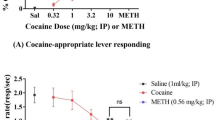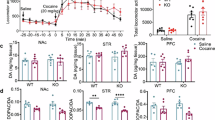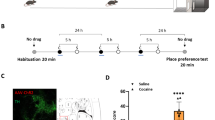Abstract
Metabotropic glutamate receptor 5 (mGluR5) null mutant (-/-) mice have been reported to totally lack the reinforcing or locomotor stimulating effects of cocaine. We tested mGluR5 -/- and +/+ mice for their locomotor and conditioned place- preference response to cocaine. Unlike the previous finding, here we show that compared to mGluR5 +/+ mice, -/- mice exhibit no difference in the locomotor response to low to moderate doses of cocaine (10 or 20 mg/kg). A high dose of cocaine (40 mg/kg) resulted in a blunted rather than absent locomotor response. We tested mGluR5 -/- and +/+ mice for conditioned place-preference to cocaine and found no group differences at a conditioning dose of 10 mg/kg, suggesting normal conditioned rewarding properties of cocaine. These results differ substantially from Chiamulera et al. (2001) and replicates Olsen et al., (2010), who found normal cocaine place-preference in mGluR5 -/- mice at 5 mg/kg. Our results indicate mGluR5 receptors exert a modulatory rather than necessary role in cocaine-induced locomotor stimulation and exert no effect on the conditioned rewarding effects of cocaine.
Similar content being viewed by others
Article PDF
Author information
Authors and Affiliations
Rights and permissions
About this article
Cite this article
Fowler, M., Varnell, A. & Cooper, D. mGluR5 knockout mice exhibit normal conditioned place-preference to cocaine. Nat Prec (2011). https://doi.org/10.1038/npre.2011.6180.1
Received:
Accepted:
Published:
DOI: https://doi.org/10.1038/npre.2011.6180.1



